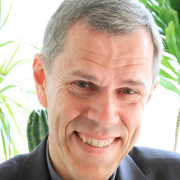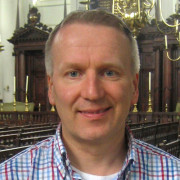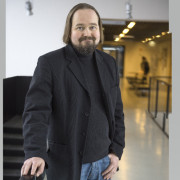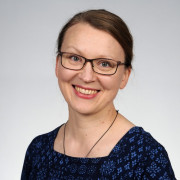In addition to the shared roots of various Churches, such as the Bible and Patristics, research at the School of Theology covers themes such as the intersection of Eastern and Western religious traditions and mental and spiritual wellbeing, as well as religion as a social and cultural issue. Research is conducted both within the traditional fields of Theology and in an interdisciplinary way across academic subjects.
What did Jesus really mean in his parables? Can the roots of modern-day hate speech be traced back to the parables or perhaps to the proclamations of the prophets? How do Stephen King or even video games draw upon the Bible? Can children's Bibles be trusted? Do Jesus and St Paul seek to influence more through reason or emotion?
The University of Eastern Finland conducts innovative exegetical research at an international level. The focus of this research is on Biblical texts. We examine their message, translations and earliest interpretations. Our key methods include rhetorical and narrative research and argumentation analysis. Through these methods, we endeavour to open up the original meaning of the Bible behind the traditional interpretations. In this work, we also utilize the interpretations of the earliest fathers of the Church, i.e. patristic exegesis. This offers an almost contemporary perspective on New Testament texts.
The Bible and its interpretations strongly influence values, ways of thinking, and faith in a wide variety of cultures around the world. This explains the importance of developing an accurate understanding and a responsible interpretation of the Bible. Research in exegetics is international in nature and is based on close co-operation, both in the Nordic countries and around the world.
How has the Christian conception of the human being changed in Western Christianity since the era of the Reformation? In what way has the social significance of Churches and religious movements changed in the Finnish and European contexts? How has the legal status of churches and religious communities been provided for in history? Answers to questions such as these and many others that concern historical changes in Christian thought and practices are sought in church historical studies.
The focus areas of Western Church History are the Late Middle Ages and the Reformation, as well as recent church history in Finland and Europe. The examination of the Lutheran tradition by investigating the origins and history of influence of the Reformation is strongly present in the school’s research and teaching. The discipline of Church History also advances extensive multi-disciplinary comparative research in the various dimensions of modernization and secularization.
Orthodox Church History focuses on the history of the Byzantine Empire (330–1453) and its ramifications in Russia and Eastern Europe. This academic subject also examines Church-state relations and questions of religious freedom in the EU and the geographical area that used commonly to be known as Eastern Europe. Other key research areas include the history of Russian ideologies and religious philosophies, as well as the history of Orthodoxy in Karelia and Finland.
The events and various phenomena in the history of Christianity are examined through a broad frame of reference. Represented in research and teaching is the spectrum of Christian life from the institutional level to grass roots. Themes examined include, for example, politics, gender and everyday life. Expertise in the field of Church History also relates to biographical research.
Church History is closely linked to many other academic disciplines. For example, it overlaps with other fields of historical research, such as the history of concepts and ideas, as well as political and cultural history. Church History also interconnects with Systematic Theology. As an academic subject, Church History is both theological and historical in its approaches and methodologies.
What are the differences and similarities in the ways science and theology study and understand reality? What kinds of theological conceptions of man exist and what is their relation to, for example, psychological and philosophical conceptions of man? What is the connection between Christian spirituality, or spiritual life, and the content of Christianity? How can spiritual life be perceived and described theologically? On the basis of which theological solutions do Christian Churches seek to converge with each other, and which factors are obstacles to the convergence between, for example, Eastern and Western Christianity? What is the basis of the Diaconia practised by churches and how has its meaning varied during different periods of history?
As an academic subject, Systematic Theology seeks to answer these and similar questions. The emphasis, here, is on the Western tradition of Christianity and its relation to the thinking of Eastern Christianity. These issues are explored in collaboration with the School’s Orthodox Theology research team. Systematic theological research is carried out using textual analysis methods, in which the objects of scrutiny are the exact contents of concepts and arguments and their underlying rationales; i.e. argumentation and the theological and philosophical origins of schools of thought.
Research in Systematic Theology focuses on 1) ecumenical issues, especially methods of Church outreach, inter-Church doctrinal discussions and ecumenism. The latter area focuses particularly on the theology of the diaconal office. 2) The theology of the Reformation and Lutheranism and its connections with Orthodox and Roman Catholic theology. 3) Christian conceptions of man; for example, the different meanings of the concept of personhood and their theological bases. 4) The dialogue between science and theology from the perspectives of, for example, perceptions of reality and argumentation methods. 5) The theology of Diaconia and especially the question of how Diaconia and its practices are theologically justified.
Depending on the topic, systematic theological research requires consideration of research in many other disciplines. An understanding of the study of philosophical views and the history of philosophy is very often necessary. Other related fields or discussion partners include various fields of historical research and the social sciences, psychology, and the natural sciences.
Systematic Theology and Patristics
How do the experiences of beauty and God relate to each other? In what way does one encounter Byzantine aesthetics in Greek art films? What is the theological basis for the veneration of relics? What did seventh-century Syrian Christians think about Islam? What kind of significance did mediaeval hermits give to dreams?
Systematic Theology and Patristics examines the thought-world of Eastern Christianity and its relations to other ideologies. The main themes relate to the Christian faith and doctrine. The subject contains several fields, the most important of which are dogmatics, patristics, the study of mysticism and spirituality, icon theology, ethics and ecumenism. In recent years, the research has focused on the following:
Liturgical studies have analysed Byzantine hymnography and its relationship to other ecclesiastical arts, as well as Byzantine and Oriental liturgical commentaries.
Patristics has focused on topics such as the development of Byzantine and Oriental Orthodox Mariology; the criteria and nature of being a Christian during the early Church; the theological basis for the veneration of relics. Research on spirituality has focused on early Syriac literature.
Research into the relationship between Eastern Christianity and other religions has analysed the image of Judaism as viewed by Christian writers up to the seventh century, as well as the relationship between Middle Eastern Christianity and early Islam.
In philosophy of religion, recent studies have focused on modern Orthodox philosophy and aesthetics, and on the boundaries between beauty and the divine, including the contributions of theological aesthetics to ecological thinking. A more practical application of the philosophy of religion is the study of the relationship between Eastern European art films and Byzantine iconographical art.
What do the Church and faith mean to Finns? How does a young person receive help from religion during crises? How does worship shape the sense of meaning in life? How do Church employees cope with their work? How is religion represented in the media?
Practical Theology examines the manifestations of Christianity in the lives of individuals, religious communities and society, and the interaction between them, and develops scientific theories based on these.
Research in Practical Theology is extensively interdisciplinary. At its core is the study of praxis, or Christian activities and practices. Here, research topics include worship, communication and media relations, Diaconia, pastoral care, church administration, and leadership. This research is also centred on lived religion. Here, research focuses on what people do and what faith and religion mean to them rather than on “official” religion and its doctrines or scriptures. Research in Practical Theology can examine religious activity and its significance from the perspective of religious professionals (such as priests or deacons), church activists and volunteers, ordinary Finns, and people distanced from the Church. Research may also focus on the religious community and its activities or the manifestation of religion in society.
There is a strong emphasis on empirical research methods in Practical Theology. This means the use of research methods of the social sciences in the study of religious life. Both qualitative and quantitative methods are used. Data collection often uses interviews, observations and questionnaires. Research often has interfaces with other disciplines, particularly psychology, sociology and education.
The traditional fields of Practical Theology include liturgy (the study of worship), hymnology (the study of hymns), homiletics (the study of sermon and communication), pastoral theology, pastoral psychology, church law, church sociology, church architecture, and the study of church organisations, administration, and leadership.
In the Western Theology study programme, research in the field of Practical Theology centres on pastoral psychology and pastoral theology.
The Orthodox Theology study programme emphasizes research on the activities and members of the Orthodox Church, as well as religious pedagogy; i.e. research on education and teaching related to religion.
Comparative Religion includes all research conducted using scientific methods that focuses on phenomena defined as religion according to scientific criteria. In Comparative Religion research focuses on people and communities who think, experience, participate and function in the context of religion. It does not take a position on the veracity or acceptability of religious mindsets and teachings and, therefore, does not support or oppose any religion.
Comparative Religion studies all the traditions in the world that can be identified as religious. In this sense, it differs from theology, which focuses on the study of one religious tradition. Comparative Religion is traditionally divided into five fields of study which approach religions from different perspectives and ask different questions: 1) anthropology of religion, 2) sociology of religion, 3) psychology of religion, 4) history of religion, and 5) phenomenology of religion. Newer fields of research which are gaining popularity include cognitive study of religion and gender studies in religion. On account of the diversity of approaches, the methodological spectrum of the discipline is necessarily very wide.
Comparative Religion research at the University of Eastern Finland draws heavily on ethnographic and other qualitative methods. Geographically speaking, research focuses on Eastern Europe, West Africa, South Asia, and the Middle East. Research is currently being carried out in the following areas:
- Secularization, secularism
- Religious conversion, religious change
- Religious violence, nationalism, and anti-Semitism
- Religion and the environment, religion and animals
- Rituals, healing
- Religious leadership
The Religious Education studies the theory and practice of religious education. As an academic subject, it operates at the interface of two phenomena – religion and education. Religious Education is based both on practical theology research in church education and on generic educational research which aims to develop religious education in schools.
Religious Education research focuses on:
- education related to religion and beliefs
- questions of principles in education, in particular human understanding and education
- teaching and learning organized by society in e.g. schools and daycare centres
- religion and values-based education provided in churches and religious communities or homes
The formation of religiosity, spirituality, and worldviews and values are also of interest to researchers in Religious Education.
Research in the field of the Religious Education is closely connected to education, psychology, sociology, the social sciences, and philosophy, and is extensive, both in terms of its contents and its methods. Research in this area favours empirical qualitative and quantitative materials and points of departure that bring the two together.
The main focus areas of research in Religious Education at the University of Eastern Finland are:
- Dialogue and education
- Religion and learning
- RE teachers and education
Research in these main focus areas takes place in genuine educational situations.
The field of dialogue and education examines, for example, religious and views-based dialogue in schools, confirmation classes, homes, classrooms, and other learning environments, as well as other questions related to diversity of points of view.
In the field of religion and learning, research may examine, for example, the manifestation of spirituality in practical education situations and the personal relevance of religious education; i.e., its significance.
The field of RE teachers and education covers the various professional processes of religious educators and student teachers and topics related to their expertise.
Postgraduate studies are connected to one or several primary areas of focus. Research material in these areas is also collected mainly in connection with educational situations. Postgraduate studies are primarily completed in English and in the form of academic articles.
Research in the field of Church Music at the University of Eastern Finland examines the music of the Orthodox Church through its history and various contemporary phenomena. It focuses on the interaction between the Orthodox tradition and other traditions and ideological currents in society. The influences and transitions between traditions are examined, for example, at the level of hymnography (liturgical chant), spiritual songs, liturgical Rites, folklore and congregational singing practices. In addition to historical research and the analysis of music and texts, church music is also studied through ethnography.
As the field of research is still young in Finland, we also conduct basic research in Finnish Orthodox church music by examining, for example, the historical development of the Finnish liturgical chant books, the profession of cantor, and choral and compositional activities.
Based in Joensuu, the International Society for Orthodox Church Music provides an international network for this area of study. The Society organizes annual church music conferences and publishes a peer-reviewed journal of research on Eastern church music.













































